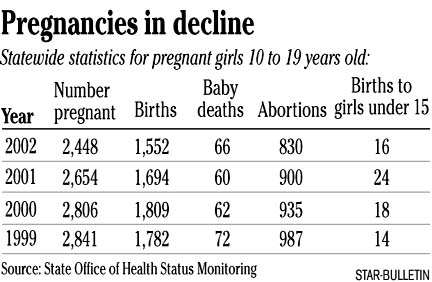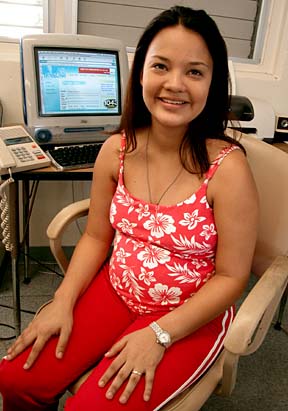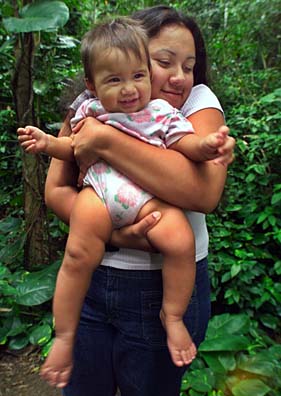
’Net quiz educates teens
about pregnancyThe test developed at Kapiolani
Hospital exposes some myths
about sexual activity
Hawaii teens are testing their knowledge about sex and pregnancy with a simple online quiz developed by the Teen Intervention Program at Kapiolani Medical Center for Women and Children.
Program Director Donna Tsutsumi-Ota created the quiz to educate intermediate and high school students about sex and reduce teen pregnancies.
The test can be found at www.TeenLineHawaii.org.
Tsutsumi-Ota said many teens get health information from the Internet, which isn't always reliable. The online test provides facts that expose many myths contributing to teenage pregnancy, she said.
"I didn't make it really hard. ... It was more of an opportunity to get them reflective and thinking about it: What would you do in this situation?" she said. "In reality, they may do something else, but it gets them thinking about the issue."
Dr. LeighAnn Frattarelli, attending physician at the Kapiolani Teen Clinic, said many teens referred there are having sex with no knowledge of contraception or the consequences.
Open to adolescents by appointment on Wednesday afternoons, the clinic provides free physical exams for contraception, sexual health and obstetrical care, and special services for pregnant teens.
Teens seeking contraception or services related to sexual health don't need parental consent, Frattarelli said.
"More than half of non-pregnant ones are coming in at a time when they haven't necessarily told their parents yet," she said.
Although Hawaii's 10- to 19-year-old female population increased to 81,063 in 2002 from 80,571 in 2001, pregnancies in that age group fell to 2,448 in 2002 from 2,654 in 2001, according to the state Health Department's Office of Health Status Monitoring.
Tsutsumi-Ota said prevention efforts have resulted in a steady decline in Hawaii and nationally in teen pregnancies but they're still higher in the United States than any other industrialized country. "We can't be complacent about it."State Department of Health 2001 statistics showed 34 percent of high school students and 12 percent of middle school students have had sex.
Hawaii had the 12th highest pregnancy rate in the nation among 15- to 19-year-olds, according to the Alan Guttmacher Institute, U.S. Teenage Pregnancy Statistics, 2000.
The Hawaii Pregnancy Prevention Campaign cites numerous problems related to teen pregnancy, such as preterm births, increased risk of sexually transmitted diseases, high-school dropouts and poverty.
"Each day in Hawaii, four girls under the age of 18 will learn they are pregnant," said Dr. Rio Banner, medical director of AlohaCare, nonprofit health plan for state QUEST members.
AlohaCare spurred the Teen Pregnancy Prevention Campaign with a $20,000 grant because pregnant teens comprise about one-third of its 46,000 QUEST members.
The state Health and Education departments helped spread the campaign to 40 public high schools and community organizations that serve teens.
The National Campaign to Prevent Teen Pregnancy has used an online test for three years and Tsutsumi-Ota localized it for use here this month.
She stressed the importance of teens talking to parents or another trusted adult as "a good protective factor for preventative pregnancy."
BACK TO TOP |
Karli Cornette wants to make a difference in someone's life.
Don't take chances,
Karli Cornette said she doesn't tell other teens not to have sex because she didn't listen to that advice.
teen warnsBut don't count on luck to avoid getting pregnant, said the 18-year-old Kalani High School senior, who is expecting in August.
She said she and her boyfriend had practiced safe sex except for one time, and she didn't think anything would happen. "Next thing you know, I'm starting to get food cravings."
Cornette plans to go to Texas with an aunt, open a business together and take some online classes. She eventually wants to study criminology at the University of Texas, but will concentrate on her child for a couple of years, she said.
She was living in California with her mother and stepfather when she became pregnant and they kicked her out, she said. Her boyfriend also left her. "He pretty much fed me old lines: 'You can trust me.'"
She weighed the options of an abortion or adoption, but said, "I wanted to make a difference in someone's life. Even though this came early ... I can still do it."
Since returning to Hawaii, her aunt and grandmother on her father's side have been taking care of her, she said.
Her pregnancy was a big shock because she had college dreams, she said. Even finishing high school requires "self will," she said.
She tells classmates: "Pregnancy doesn't just change your life. It changes lives around you.
"They're pretty much looking at my belly more than me, but they really listen. ... They're probably thinking the same thing I was thinking before I was pregnant: 'I wonder how hard it is for her' or 'She should have made better choices.'"
Helen Altonn
Lack of knowledge
Melia Keliikoa said she was clueless when she became pregnant two years ago at age 17.
leads to pregnancy"I didn't know nothing at all," she said.
She said she "didn't really have any safe-sex talk" with her parents or anyone, and though she had some sex education in elementary school, "I kind of forgot by intermediate and high school."
"I thought all my friends are doing it, so I had to do it to fit in," she said.
Keliikoa said her boyfriend helps with their 9-month-old daughter, Tracy, but they live apart.
Keliikoa, now 19, dropped out of Roosevelt High School in her senior year but is going to night classes at McKinley High School to get a diploma. She also wants to go on to college.
She works with the Kapiolani Teen Intervention Program's Parent and Child Education Program, performing puppet shows for fifth- and sixth-graders about sexuality.
She gives her 14-year-old sister the same speech: "We tell them: Don't be afraid to go to parents; don't listen to friends' advice; you don't have to have sex to fit in; education is more important, and the consequences of what we went through."
Keliikoa was scared to talk to her parents about sex and was most afraid of her mother because "she was the one always telling us not to have sex, to graduate, not to look for boyfriends, but I didn't listen," she said. "I thought having it once, I wouldn't get pregnant, that it would happen to others but not me."
Her mother was disappointed and angry at first but has supported her, Keliikoa said. "She told me I should have come to her; she would have helped me get protection."
Helen Altonn


